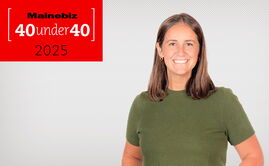Processing Your Payment
Please do not leave this page until complete. This can take a few moments.
- News
-
Editions
View Digital Editions
Biweekly Issues
- Nov. 17, 2025
- November 03, 2025
- October 20, 2025
- October 6, 2025
- September 22, 2025
- September 8, 2025
- + More
Special Editions
- Lists
- Viewpoints
-
Our Events
Event Info
Award Honorees
- Calendar
- Biz Marketplace
Secure a non-bank SBA 7(a) loan
 Rob Wilson
Rob Wilson
Every week at CEI 7(a) Financing LLC, known as C7a, a wide variety of small business loan applications arrive on our desks. Most would present challenges to conventional lenders, but as a mission-oriented, non-bank SBA 7(a) lender, that's what we are here for. We help viable businesses obtain financing despite their challenges.
From experience, we know that many viable small businesses, even if they have the cash flow to support a loan, still struggle to find a bank or institution that will lend them the capital they need to thrive and grow.
We did a straw poll among C7a staff to identify the five most common challenges borrowers face:
1. Less-than-perfect credit
Conventional lenders place a heavy reliance on personal and business credit scores. “Poor credit” often means an application is automatically declined. At C7a, we look for borrowers who have a history of being financially responsible, but we understand that unfortunate things can happen to good people and businesses. We work to understand what happened and to assess any relevance. For example, many individuals and businesses were hit hard by the recession and are still dogged by short sales or bankruptcies. If they faced difficult circumstances, but acted responsibly, these may not be deal breakers for C7a. The same can apply to a financial crisis caused by personal or family medical issues, job losses or employee fraud.
2. 'Banks just don't do it for me'
American Banker reporter Penny Crosman makes the argument that “bank bias” goes both ways: Borrowers may avoid banks because of a past history or fear of rejection, and banks may avoid borrowers who do not meet certain criteria. In our experience, she's right. If you don't fit into what commercial lenders refer to as their “credit box,” you may be out of luck. On the other side of the coin, people who have had unproductive or negative experiences with banks understandably may want to avoid future interactions.
3. Not enough collateral
Conventional lenders shy away from applicants who don't have enough physical assets to pledge as collateral. One of the benefits of the SBA 7(a) program is that, with the support of the SBA's partial guarantee, C7a can be flexible with regard to collateral requirements. Also, in C7a's analysis, other strengths, such as a strong historical operating cash flow, can compensate for lack of collateral.
4. 'I don't have enough money to put down'
Sometimes business owners and entrepreneurs have the opportunity or the need to buy real estate — perhaps to secure a permanent operating location or to grow. Often the timing isn't the best. Companies may have the earnings to service a loan, but not the 25% to 30% cash down payment required with a conventional real estate loan. In this situation, a 7(a) loan may work with a smaller cash infusion, or by utilizing the equity that is already in the company to support the loan.
5. 'Congrats, you've been approved, but not for as much as you requested'
This happens with some regularity, often because a conventional lender is restricted in the amount it can lend, or its underwriting criteria can only support a portion of the loan requested. It is one of the most disappointing and frustrating things for a business to hear from a loan officer. Usually, an applicant needs all the capital it has requested.
C7a can often provide the required amount when others will not. The upper limit on any given loan is $5 million, a larger lending limit than many mission-based lenders, and we are often able to be more creative in our structuring and underwriting, allowing us to make loans to viable businesses that institutional lenders could not.
Rob Wilson is CEO of CEI 7(a) Financing LLC, known as C7a, a division of Brunswick-based Coastal Enterprises Inc.
Mainebiz web partners
Related Content

The Giving Guide
The Giving Guide helps nonprofits have the opportunity to showcase and differentiate their organizations so that businesses better understand how they can contribute to a nonprofit’s mission and work.
Learn More
Work for ME
Work for ME is a workforce development tool to help Maine’s employers target Maine’s emerging workforce. Work for ME highlights each industry, its impact on Maine’s economy, the jobs available to entry-level workers, the training and education needed to get a career started.
Learn More
Groundbreaking Maine
Whether you’re a developer, financer, architect, or industry enthusiast, Groundbreaking Maine is crafted to be your go-to source for valuable insights in Maine’s real estate and construction community.
Learn more-
The Giving Guide
The Giving Guide helps nonprofits have the opportunity to showcase and differentiate their organizations so that businesses better understand how they can contribute to a nonprofit’s mission and work.
-
Work for ME
Work for ME is a workforce development tool to help Maine’s employers target Maine’s emerging workforce. Work for ME highlights each industry, its impact on Maine’s economy, the jobs available to entry-level workers, the training and education needed to get a career started.
-
Groundbreaking Maine
Whether you’re a developer, financer, architect, or industry enthusiast, Groundbreaking Maine is crafted to be your go-to source for valuable insights in Maine’s real estate and construction community.
ABOUT
NEW ENGLAND BUSINESS MEDIA SITES
No articles left
Get access now
In order to use this feature, we need some information from you. You can also login or register for a free account.
By clicking submit you are agreeing to our cookie usage and Privacy Policy
Already have an account? Login
Already have an account? Login
Want to create an account? Register
Get access now
In order to use this feature, we need some information from you. You can also login or register for a free account.
By clicking submit you are agreeing to our cookie usage and Privacy Policy
Already have an account? Login
Already have an account? Login
Want to create an account? Register










Comments